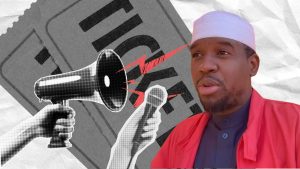The Guardian, at the time of writing, has yet to respond to complaints submitted early last week in connection with an article that appeared to endorse an antisemitic blood libel.
In an article titled “Adelaide Writers’ Week: rare moments of empathy and nuance found amid a storm of controversy”, written by journalist Sian Cain and dated 11th March 2023, the write quotes a line from a poem by a young Arab activist with a history of inflammatory remarks on social media.
In the poem, Mohammed El-Kurd, a correspondent for The Nation, writes of Israel: “They harvest organs of the martyred, feed their warriors our own.”
The claim that Israel is harvesting of organs is reminiscent of the medieval blood libel, in which Jews were alleged to murder Christian children in order to use their blood in religious rituals.
According to the International Definition of Antisemitism, “Using the symbols and images associated with classic antisemitism (e.g. claims of Jews killing Jesus or blood libel) to characterise Israel or Israelis” is an example of antisemitism.
The article went on to say “El-Kurd, speaking to the crowd via video link from New York, addressed the line about organs that some had labelled antisemitic: it was based on easily found and widespread news reports from 2009 in which the Israeli military admitted pathologists had harvested organs from dead Palestinians, and others, without the consent of their families for years.”
These are not Mr El-Kurd’s words but the journalist’s, and are grossly misleading in two ways.
First, the words are lifted almost verbatim from a Guardian article of almost fifteen years ago, an article that itself was subject to correction because it was misleading. The truth, as the correction recognised, was that Israeli pathologists had extracted organs from a range of categories of deceased persons, including Israelis. By emphasising “Palestinians” and marginalising “and others”, the article gives a misleading impression of the practice, implying that it was targeted specifically at one group.
Second, Mr El-Kurd had claimed in his poem: “They harvest organs of the martyred, feed their warriors our own.” The justification provided by the journalist of Mr El-Kurd’s line makes no reference to the consumptionof organs. The notion that Jewish people consume the blood and organs of others is a textbook antisemitic blood libel, and this was not only not addressed but, by ignoring it while appearing to justify the rest of the line, appeared indirectly to defend it.
Worse still, the journalist implies that it is unreasonable to label the harvesting allegation as antisemitic because it is, in fact, “easily found” to be true. While she may be paraphrasing Mr El-Kurd, that is not clear from the article. If they are Mr El-Kurd’s words, then they should have been quoted or presented as such and challenged, for, pace Mr El-Kurd, there is no basis for the antisemitic allegation that Jews eat the organs of others. If, alternatively, they are not Mr El-Kurd’s words but the journalist’s – which, given that they paraphrase the earlier Guardian article, seems likely – then the journalist has essentially defended his poem, including the allegation about consumption of organs. This adds The Guardian’s insult to the injury inflicted by Mr El-Kurd.
Not only is this atrocious journalism, looking to defend a controversial figure instead of putting his views in full context and pointing out their inaccuracies, but it promotes a horrific antisemitic trope and implies that those who take issue with it are buffoons for not uncovering the “easily found” evidence.
We and CAMERA, which brought the article to our attention, submitted complaints to The Guardian. We called on the newspaper to urgently correct the article and apologise for giving such a prominent platform to racist myth.
To date, neither we nor CAMERA have heard back from The Guardian.









